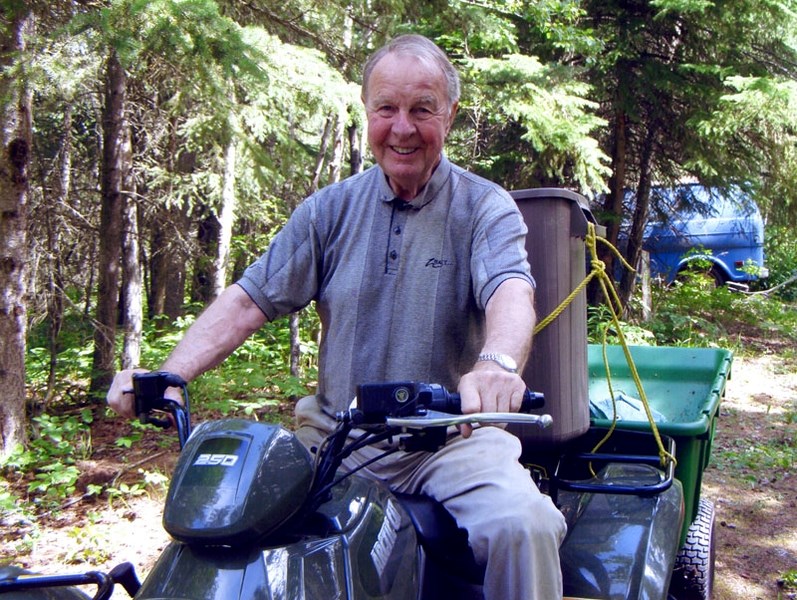A quiet family memorial service was held Dec. 29 in the Sturgeon Community Hospital chapel for Jock Fyfe, who died on Christmas Eve after a lengthy illness.
Jock had suggested the chapel himself as a location for the service, because he spent so much time working and volunteering for the Sturgeon Community Hospital Foundation. He was the hospital foundation’s first executive director.
“Jock loved building things whether it was things of wood, or organizations or working together to build things with volunteers. He was really in his element working at the foundation because he felt the hospital was an important part of the community and he wanted to be involved in a way that would make it a better place,” his widow Myrna Fyfe said.
Myrna, who served as St. Albert’s MLA from 1979 until 1986, explained that her husband did not like to discuss his age, so she purposely left his birth date off of all death notifications.
“He was an adventurous kind of guy,” she said.
The Fyfes first met during the early 1960s in Fort Smith, Alta., where she was teaching school and Jock was working with Métis organizations to develop low-cost mortgage and housing programs for residents in northern communities. They were married in 1965.
Jock, a Scot, had already had an illustrious career as a pilot in the Royal Air Force, which he joined with his parents’ permission at the outbreak of the Second World War. At the time, he had been working as an apprentice steel engineer.
After his initial six months of pilot training, Jock was sent to Egypt, South Africa and to India, where he was based for the remainder of the war, often flying reconnaissance missions over treacherous terrain in life-threatening conditions.
Shortly after flying into an airbase in southern China the Japanese bombed the runway and destroyed several British airplanes. Jock and 180 comrades escaped by setting off into the jungle. Their trek would last six gruelling months and before they reached India, three-quarters of the men had died.
Myrna’s knowledge of this period in her husband’s life is minimal, because he seldom talked about it.
“I don’t know exactly where he was but I know he walked for six months and they lived off the fruit they could find on the trees. When they got to India, no one believed that they were British. They had to prove their identity. His family in Scotland had been notified that he was dead, ” she said.
Daughter Jane Fyfe added one more tidbit about this period in her father’s life.
“He told me they carried piano wire so they could catch the snakes in the trees,” she said.
The Fyfes’ neighbour Wilf Borgstede knew Jock for 46 years, but until last week when he spoke to Myrna before the funeral service, he had never heard any of his friend’s war stories.
“He was a very humble man. He only made one reference to it over the years and that once was when he told a humorous, slightly off-colour story about being in the hospital after his trek,” Borgstede said, adding that he also just heard recently that Jock had received a medal from King George VI for salvaging his plane and saving his crew during the Berlin Airlift in 1948.
At the time Berlin was isolated and the people were starving. The Allied countries supplied food to Berlin but the Russians would dive-bomb the planes to scare the pilots.
Nazi sympathizers sometimes sabotaged the planes by putting waxed paper over the engines so they would overheat. That happened to Jock’s plane too, but he managed to dump his cargo of flour and to limp back to base with just one engine.
“Jock was awarded the Royal Air Force Cross, and the King presented it to him,” Myrna said.
After the Berlin Airlift, Jock worked for BOAC for a time before immigrating to Canada, where he hoped to fly the Avro Arrow, which at the time was being touted as the world’s most advanced aircraft. The Diefenbaker government cancelled the project but Jock stayed in Canada where he flew for a number of Calgary-based oil companies.
His next career was based out of Churchill, Man. and he had many adventures along the DEW line and along the Arctic Coast. When he left flying he joined the federal department of Northern Affairs as an administrative officer.
The Fyfes moved to St. Albert in 1966 and Jock worked for the Alberta government initiating a low-cost mortgage program. Later he worked as executive director or chair for a number of agencies including the Old Strathcona Foundation, CNIB, Preventive Social Services Board and as director of the St. Albert Place Society.
“He understood fundraising and finances. I believe before St. Albert Place was built their goal was to raise $300,000,” Myrna said.
Borgstede remembered how supportive Jock was of his wife’s career as a member of city council and as an MLA.
“He was an empowering presence for Myrna and always supported her in her work,” Borgstede said.
“Jock always had a project on the go, whether it was building his garage or building his log cabin at the lake, but it was his sense of humour that gave him his identity. When Jock was around there was always a sense of joy, of cheer and laughter because he had a playful spirit about him. He was the kind of neighbour, who for 40 some years I joked with over the fence and yet St. Albert owes him a lot. He gave a lot and blessed St. Albert by his presence in so many ways,” Borgstede said.
Jock Fyfe is survived by Myrna, his wife of 47 years, by his daughter Jane, sister-in-law Dianne (John) Storey, brother-in-law Lorne (Elizabeth) Parker, by his brother Bill (Anne) and sister Elizabeth and extended family in Scotland. He was predeceased by his daughter Catherine and sister Senga.




